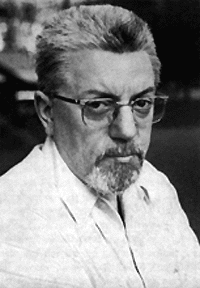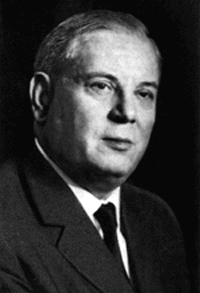
Prof. Bernd Alois Zimmermann

Prof. Dr. Herbert Eimert
PETER HÜBNER: Once
a week I met Professor Zimmermann in a nice cafe in the Aachener Street –
not far from his flat. We sat opposite each other in the corner of a Spanish-style
tavern – he with a miniature bottle of champagne, called Pikkolo, and
I with a cup of tea, and we spoke about philosophical borderline questions
reaching into the area of music.
The approach to our talks, however, was never music, but always philosophy.
For both of us, music was always only a means to the end of bringing philosophical
ideas closer to other people, which cannot be brought closer through words
alone.
Not a single note was mentioned or even recorded or discussed, it was about
the meaning and use of music in the field of cognition of the world in general.
Bernd Alois Zimmermann was a man of immense philosophical scope, and his great
musical scope was only the expression of this mental scope – that is
its effectiveness, but not its cause. The experts around him only saw, as
far as I can tell, his music, but not what moved him inside, and was a basis
for his music as a philosophical concept.
Thus, he didn’t give me any music-teaching in the usual sense, but he
possibly gave me the most dignified music-teaching which exists. He expressed
to me the mental and philosophical basis of his musical work – and this
he did very profoundly and extensively.
He was open-minded – especially in the field of transcendental philosophical
questions. He was a very serious composer – in contrast to superficial,
I never saw him laugh superficially –, but he had the natural inner cheerfulness
of a serious person.

Prof. Bernd Alois Zimmermann

Prof. Dr. Herbert Eimert
JOURNALIST:
Mr. Hübner, looking at your career, one question is specially interesting
to me: what do you think of music-teaching and particularly of composition-teaching
at an academy of music?
PETER HÜBNER: Just listen to what Beethoven says about this: “without
in the least wanting to introduce myself to you as a master, I can assure
you that I lived in a small insignificant place, and almost everything I became
there as well as here, I have only become through myself”. The same applies
for all great classical tone creators. Verdi was even chucked out of the academy
for being incapable, which was then later named after him.
In my opinion, composition-teaching – as it is officially intended at
an academy of music – is pure nonsense. In such a way, only the mediocre
is supported. And what becomes of the mediocre? In an “ideal case”
a professor of composition, a music professor or the head of a music department
at a radio and/or TV station or editorial department of a newspaper, or a
conductor etc.
I am not saying that all professors of composition are a dead loss.
Bernd Alois Zimmermann, Herbert Eimert and several others demonstrate very
clearly that they can be outstanding experts.
JOURNALIST: You studied composition under Zimmermann at the academy
of music in Cologne. What was this teaching like?
| Site Map |
| Editorial |
| R & D |
| Music Education |
| Archetypal Career of the Classical Composer |
| The
natural Creation |
| Music |
| Peter Hübner |
| International Experts |
| International Media |
| Asian Media |
| Main Links |
| STORE |